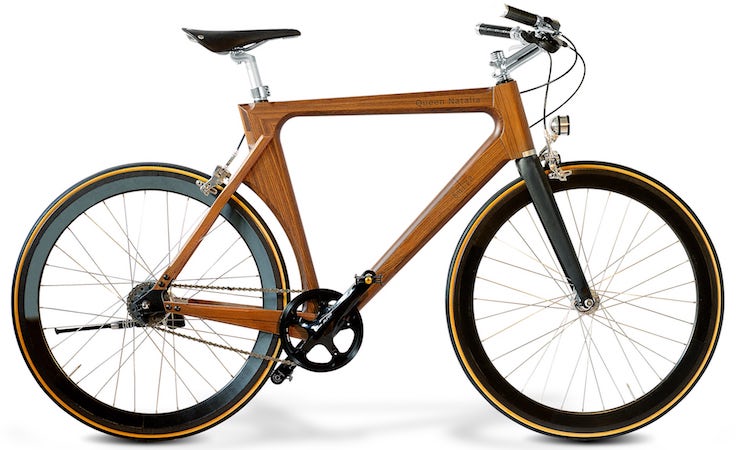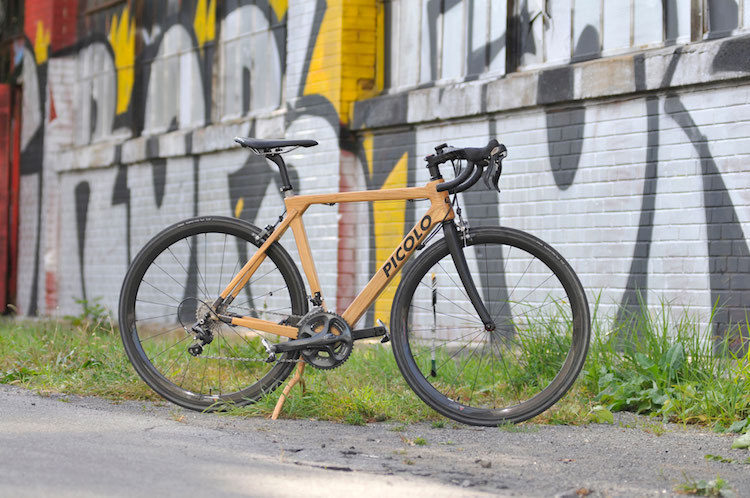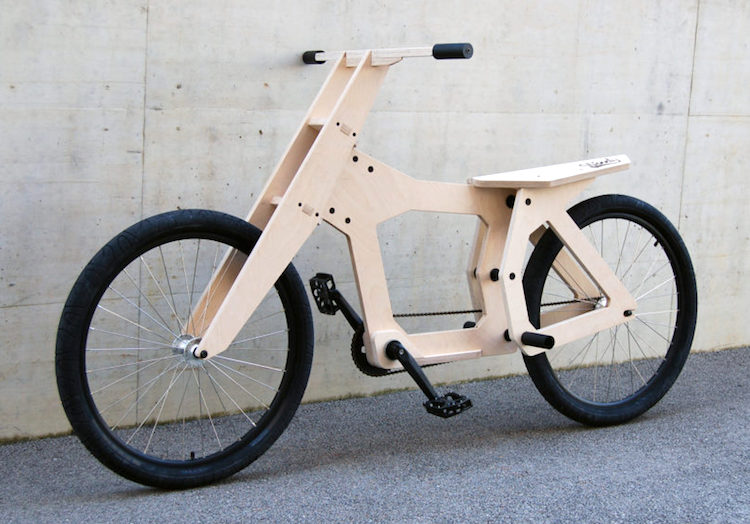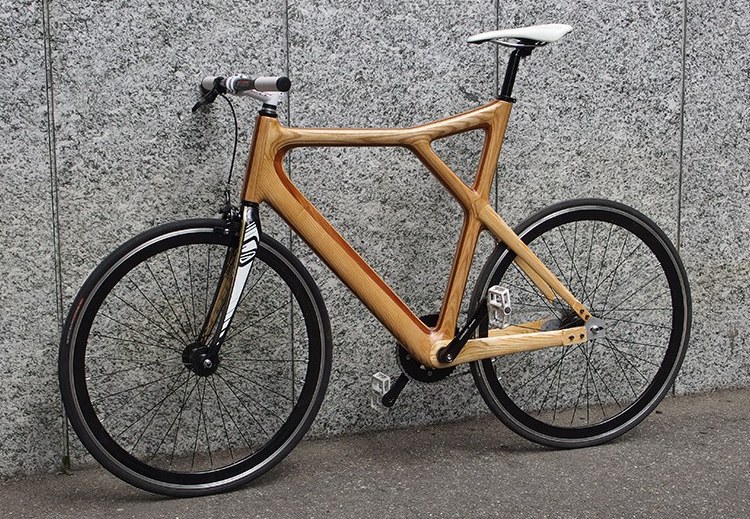Top 10 of wood and bamboo bicycles
Published 6 March 2018 by Cherise Fong
Our selection of bicycles made of wood and bamboo, handcrafted by artisans or built by you. From the professionally polished to the customized DIY, every frame is unique.
Forget steel (too heavy), aluminum (too weak) or carbon fibre (too expensive and not eco-friendly). When it comes to building a bicycle frame, nothing beats wood or bamboo—materials that are organic and sustainable, strong and light, rigid yet flexible, and absorb vibrations without the need for suspension.
Pro: made for you
The Dutch company Bough Bikes produces beautiful bicycles made of sustainable solid oak sourced from the Jura region in France, manufactured on a CNC milling machine. With the slogan “Be moved by nature”, they project their vision of urban bicycles that are esthetic, ecological and accessible. The basic city model (€1,565) can be enhanced with various transport options, converted to an e-bike (€2,850) or even used as a public bicycle to rent or share.
Presentation of Bough Bikes (in Dutch):
In a country famed for competitive cycling, the Italian manufacturer Selva, situated in the Alps north of Milan, sells its ultralight road bikes with luxury frames made of various types of wood (beech, teak, cherry, padouk, wenge), customizable with aluminum, titanium or carbon fibre components, weighing between 8kg and 11kg, priced between €2,490 and €5,490.

In Canada, the Quebecois studio Picolo Vélo proudly uses ash wood indigenous to Quebec to build its performance road bikes, lovingly laminating each frame with a water-repellent, anti-UV, polycarbonate hybrid varnish. While the first models are still prototypes, their recent exposure in bicycle expos, and especially Picolo Vélo’s affiliation with Amik Ebénisterie in Montreal, are promising of a commercial launch in the near future.

The young French woodworking studio In’Bô, whose slogan “handmade in the Vosges” conveys their passion for eco-friendly craftsmanship, also makes wooden glasses frames and skateboards from beech wood. Best of all, In’Bô builds bicycles using bamboo harvested from a sustainable forest in the south of France, assembled with linen fibers from Normandy and “56% bio-sourced” epoxy resin. With high-profile ambassadors and frame geometries developed with a semi-pro racer, In’Bô’s bicycles are rigorously up to professional standards, custom-made to order and not at all cheap (€5,490 to €8,290 for a complete bike). Their models are also available as a kit (frame + rollers + fork) or frame only.
Presentation of In’Bô bamboo bicycles:
Founded by a former U.S. cycling champion in partnership with a designer and bamboo expert expatriated in Vietnam, the small American company Boo Bicycles has been building bicycles from sustainable top-grade Vietnamese tam vong bamboo since 2009. Their models, some of which incorporate aluminum or carbon fibre, range from city bike ($995 for the frame only) to cyclocross ($4,895 for the frame only), as well as road bike, mountain bike and the iconic fat bike.
Building a Boo bicycle:
DIY: made by you
For those who can’t afford one of the models above, or who simply prefer to build their own wood or bamboo bike, here are a few tutorials, kits and workshops to get started.
While it may not seem an easy task, and even a bit dangerous to build a two-wheeled vehicle without any experience in either woodworking or bicycle mechanics, you can always give it a shot. In autumn 2017, Olivier Audet, fab manager of Konk Ar Lab in France, decided to do just that, as he was looking for a DIY bike to build as an educational project at the fablab. That’s when he discovered the Woody Bike, designed in 2007 by Tymothé Auberson, who until then hadn’t found a suitable opportunity to share his documentation. After discussion, the bicycle designer happily sent him all his files, and Konk Ar Lab continued their research. Finally in January 2018, the team project came to fruition, thanks to contributions along the way from Arquimaña and CADRE, a local French association for repairing and recycling bicycles.

For DIY fanatics who are ready to give it their all in the fablab, the wooden bicycle project Rootless, designed by Italian craftsman Andrea Patrucco, offers a complete tutorial accompanied by all its 3D files in CC BY-SA-NC, so that anyone can download them and build their own wood bike. And if Rootless sounds vaguely familiar, it was also one of the finalists of the YouFab Awards in 2014.

Sandwichbikes, or the “Ikea bicycle”, sells all its models (wood or steel fork, 1 or 2 speeds) in the form of a DIY assembly kit. The beech wood used for the frame is sourced from a sustainable forest in Germany. The bikes can even be customized as Van Gogh paintings or other personal fantasies. Also available is a limited-edition Walnut Veneer e-bike.
Assembling a Sandwichbike:
American designer Craig Calfee has been building and repairing carbon fibre bicycles (including Greg LeMond’s) since 1987, but in the past decade, he has been working a lot with bamboo. He has also given workshops in Ghana, Uganda, Cuba, Bali, etc., to make sustainable frames and bikes from the local bamboo that people are already used to harvesting and building with. He even offers a customized DIY bamboo frame kit made especially for beginners, complete with tools and instructional videos, available on his website.
Presentation of Calfee’s DIY bamboo bike kit:
Bamboo Bicycles Beijing (BBB) is one of several projects in recent years (along with Bamboo Bicycle Club in London, Bamboo Bee in Singapore, Ghana Bamboo Bikes and Booomers in Ghana…) to provide workshops for local people to learn how to build bespoke bamboo bikes together, both for themselves and for others. BBB began as the brainchild of David Chin-Fei Wang, an American from Boston living in Beijing, who wanted to teach people to build their own bikes from bamboo and other upcycled bicycle parts. Since 2013, the association continues to host community workshops around Beijing, Boston and even in Taiwan, inspiring more educators and makers along the way. While the professional world of wood and bamboo bicycle crafting is 99% male and primarily Western, we especially appreciate these intentionally inclusive initiatives.
NTDTV report on Bamboo Bicycles Beijing (2015):
Read more Makery articles about bicycles
